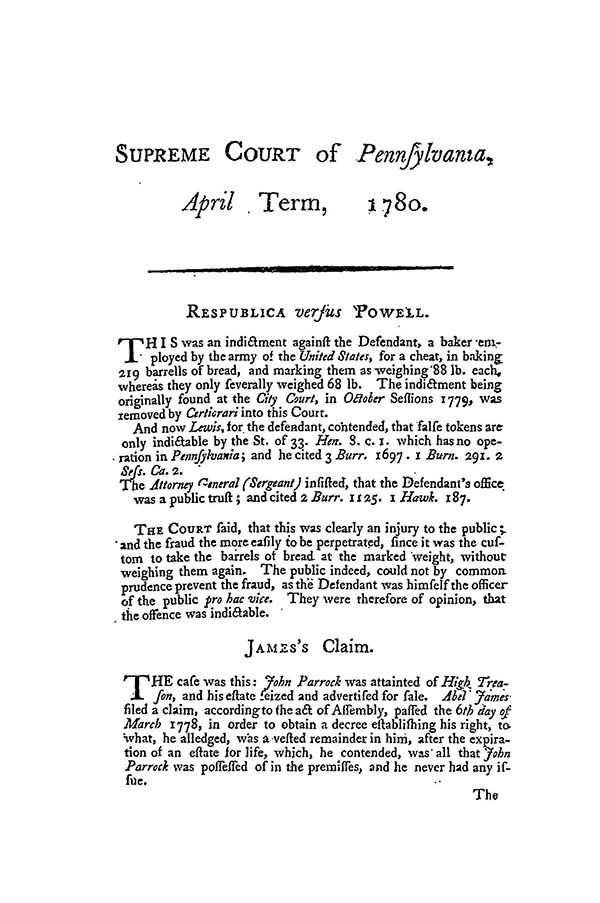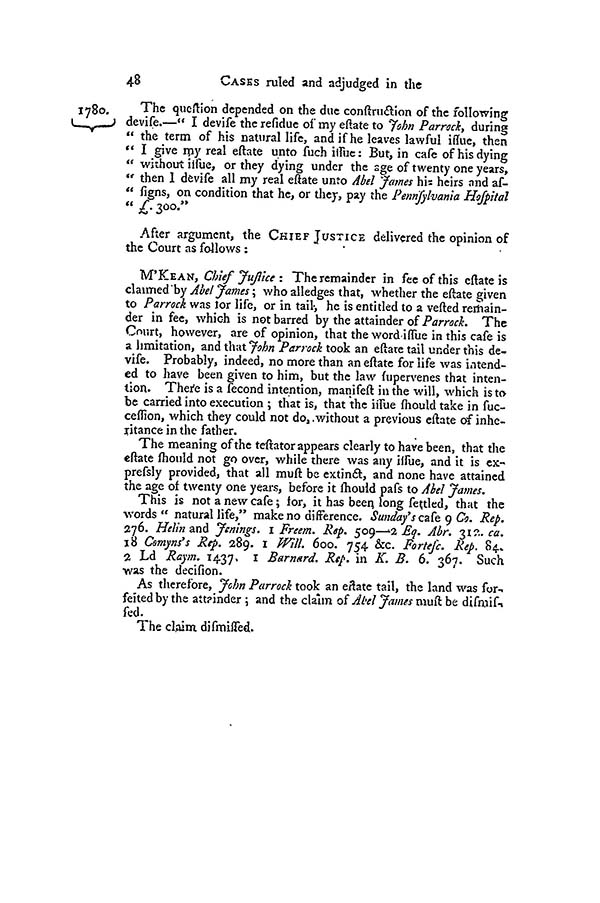Respublica v. Powell, 1 Dall. 47 (1780) and James's Claim, 1 Dall. 47, 1 U.S. 47 (1780)
Superior Court of Pennsylvania
April Term, 1780
Respublica versus Powell
This was an indictment against the Defendant, a baker employed by the army of the United States, for a cheat, in baking 219 barrells of bread, and marking them as weighting 88 lb. each, whereas they only severally weighed 68 lb. The indictment being originally found at the City Court, in October Seffions 1779, was removed by Certiorari into this Court.
And now Lewis, for the defendant, contended, that false tokens are only indictable by the St. of 33. Hen. 8. c. 1. which has no operation in Pennsylvania; and he cited 3 Burr. 1697. 1 Burn. 291. 2 Sess. Ca. 2.
The Attorney General (Sergeant) insisted that the Defendant's office was a public trust; and cited 2 Burr. 1125. 1 Hawk. 187.
The Court said, that this was clearly an injury to the public; and the fraud the more easily to be perpetrated, since it was the custom to take the barrels of bread at the marked weight, without weighting them again. The public indeed, could not by common prudence prevent the fraud, as the Defendant was himself the officer of the public pro hac vice. They were therefore of opinion, that the offence was indictable.
Citation: Respublica v. Powell, 1 U.S. 47, 1 Dall. 47 (Pa. 1780)
James's Claim.
The case was this; John Parrock was attainted of High Treason, and his estate seized and advertised for sale. Abel James filed a claim, according to the act of Assembly, passed the 6th day of March 1778, in order to obtain a decree establishing his right, to what, he alledged, was a vested remainder in him, after the expiration of an estate for life, which, he contended, was all that John Parrock was possessed of in the premisses, and he never had any issue.
The question depended on the due construction of the following devise.—"I devise the residue of my estate to John Parrock, during the term of his natural life, and if he leaves lawful issue, then I give my real estate unto such issue: But, in case of his dying without issue, or they dying under the age of twenty one years, then I devise all my real estate unto Abel James his heirs and assigns, on condition that he, or they, pay the Pennsylvania Hospital £. 300.'
After argument, the Chief Justice delivered the opinion of the Court as follows:
M'Kean, Chief Justice: The remainder in fee of this estate is claimed by Abel James; who alledges that, whether the estate given to Parrock was for life, or in tail, he is entitled to a vested remainder in fee, which is not barred by the attainder of Parrock. The Court, however, are of opinion, that the word issue in this case is a limitation, and that John Parrock took an estate tail under this devise. Probably, indeed, no more than an estate for life was intended to have been given to him, but the law supervenes that intention. There is a second intention, manifest in the will, which is to be carried into execution; that is, that the issue should take in succession, which they could not do, without a previous estate of inheritance in the father.
The meaning of the testator appears clearly to have been, that the estate should not go over, while there was any issue, and it is expressly provided, that all must be extinct, and none have attained the age of twenty one years, before it should pass to Abel James.
This is not a new case; for, it has been long settled, that the words "natural life," make no difference. Sunday's case 9 Co. Rep. 276. Helin and Jenings. 1 Freem. Rep. 509—2 Eq. Abr. 312. ca. 18 Comyns's Rep. 289. 1 Will. 600. 754 &c. Fortesc. Rep. 84. 2 Ld Raym. 1437, 1 Barnard. Rep. in K. B. 6. 367. Such was the decision.
As therefore, John Parrock took an estate tail, the land was forfeited by the attainder; and the claim of Abel James must be dismissed.
The claim dismissed.
Citation: James's Claim, 1 U.S. 47, 1 Dall. 47 (Pa. 1780)


Last modified: December 11, 2014